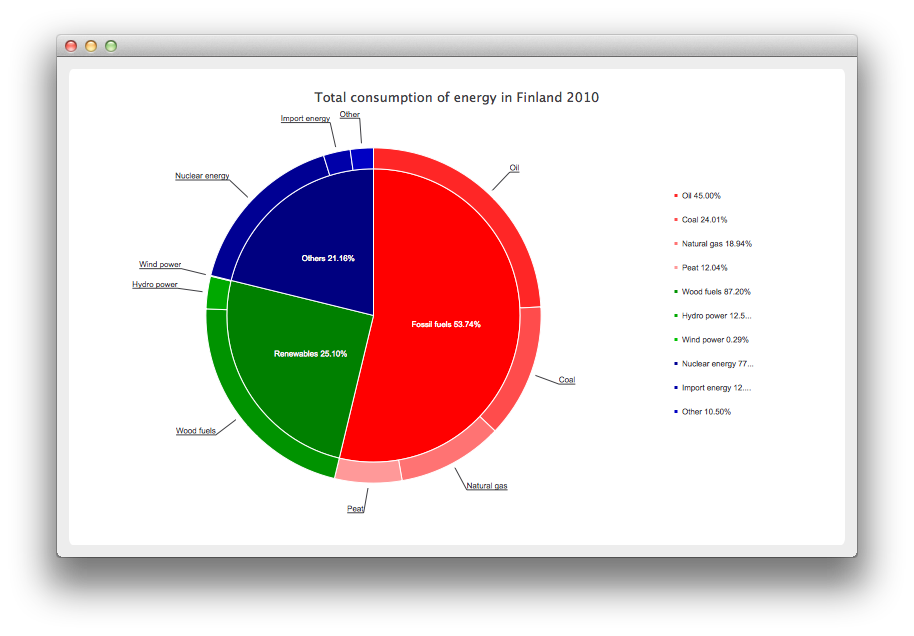Donut Chart Breakdown Example
This example shows how to use create a donut breakdown chart using QPieSeries API.

Running the Example
To run the example from Qt Creator, open the Welcome mode and select the example from Examples. For more information, visit Building and Running an Example.
Creating Donut Breakdown Charts
Let's start by defining some data for the chart.
// Graph is based on data of 'Total consumption of energy increased by 10 per cent in 2010' // Statistics Finland, 13 December 2011 // http://www.stat.fi/til/ekul/2010/ekul_2010_2011-12-13_tie_001_en.html QPieSeries *series1 = new QPieSeries(); series1->setName("Fossil fuels"); series1->append("Oil", 353295); series1->append("Coal", 188500); series1->append("Natural gas", 148680); series1->append("Peat", 94545); QPieSeries *series2 = new QPieSeries(); series2->setName("Renewables"); series2->append("Wood fuels", 319663); series2->append("Hydro power", 45875); series2->append("Wind power", 1060); QPieSeries *series3 = new QPieSeries(); series3->setName("Others"); series3->append("Nuclear energy", 238789); series3->append("Import energy", 37802); series3->append("Other", 32441);
Then we create a chart where we add the data. Note that this is our own chart derived from QChart.
DonutBreakdownChart *donutBreakdown = new DonutBreakdownChart(); donutBreakdown->setAnimationOptions(QChart::AllAnimations); donutBreakdown->setTitle("Total consumption of energy in Finland 2010"); donutBreakdown->legend()->setAlignment(Qt::AlignRight); donutBreakdown->addBreakdownSeries(series1, Qt::red); donutBreakdown->addBreakdownSeries(series2, Qt::darkGreen); donutBreakdown->addBreakdownSeries(series3, Qt::darkBlue);
Our own chart works in such a way that we create a main series in the constructor we create a main series, which aggregates the data provided by the breakdown series. This is the piechart in the center.
DonutBreakdownChart::DonutBreakdownChart(QGraphicsItem *parent, Qt::WindowFlags wFlags) : QChart(QChart::ChartTypeCartesian, parent, wFlags) { // create the series for main center pie m_mainSeries = new QPieSeries(); m_mainSeries->setPieSize(0.7); QChart::addSeries(m_mainSeries); }
When a breakdown series is added the data is used to create a slice in the main series and the breakdown series itself is used to create a segment of a donut positioned so that it is aligned with the corresponding slice in the main series.
void DonutBreakdownChart::addBreakdownSeries(QPieSeries *breakdownSeries, QColor color) { QFont font("Arial", 8); // add breakdown series as a slice to center pie MainSlice *mainSlice = new MainSlice(breakdownSeries); mainSlice->setName(breakdownSeries->name()); mainSlice->setValue(breakdownSeries->sum()); m_mainSeries->append(mainSlice); // customize the slice mainSlice->setBrush(color); mainSlice->setLabelVisible(); mainSlice->setLabelColor(Qt::white); mainSlice->setLabelPosition(QPieSlice::LabelInsideHorizontal); mainSlice->setLabelFont(font); // position and customize the breakdown series breakdownSeries->setPieSize(0.8); breakdownSeries->setHoleSize(0.7); breakdownSeries->setLabelsVisible(); const auto slices = breakdownSeries->slices(); for (QPieSlice *slice : slices) { color = color.lighter(115); slice->setBrush(color); slice->setLabelFont(font); } // add the series to the chart QChart::addSeries(breakdownSeries); // recalculate breakdown donut segments recalculateAngles(); // update customize legend markers updateLegendMarkers(); }
Here's how the start and end angles for the donut segments are calculated.
void DonutBreakdownChart::recalculateAngles() { qreal angle = 0; const auto slices = m_mainSeries->slices(); for (QPieSlice *slice : slices) { QPieSeries *breakdownSeries = qobject_cast<MainSlice *>(slice)->breakdownSeries(); breakdownSeries->setPieStartAngle(angle); angle += slice->percentage() * 360.0; // full pie is 360.0 breakdownSeries->setPieEndAngle(angle); } }
The legend markers are customized to show the breakdown percentage. The markers for the main level slices are hidden.
void DonutBreakdownChart::updateLegendMarkers() { // go through all markers const auto allseries = series(); for (QAbstractSeries *series : allseries) { const auto markers = legend()->markers(series); for (QLegendMarker *marker : markers) { QPieLegendMarker *pieMarker = qobject_cast<QPieLegendMarker *>(marker); if (series == m_mainSeries) { // hide markers from main series pieMarker->setVisible(false); } else { // modify markers from breakdown series pieMarker->setLabel(QString("%1 %2%") .arg(pieMarker->slice()->label()) .arg(pieMarker->slice()->percentage() * 100, 0, 'f', 2)); pieMarker->setFont(QFont("Arial", 8)); } } } }
Instead the main level slices show the percentage on the label.
MainSlice::MainSlice(QPieSeries *breakdownSeries, QObject *parent) : QPieSlice(parent), m_breakdownSeries(breakdownSeries) { connect(this, &MainSlice::percentageChanged, this, &MainSlice::updateLabel); } void MainSlice::updateLabel() { this->setLabel(QString("%1 %2%").arg(m_name).arg(percentage() * 100, 0, 'f', 2)); }
Now that we have our chart defined, we can finally create a QChartView and show the chart.
QMainWindow window; QChartView *chartView = new QChartView(donutBreakdown); chartView->setRenderHint(QPainter::Antialiasing); window.setCentralWidget(chartView); window.resize(800, 500); window.show();